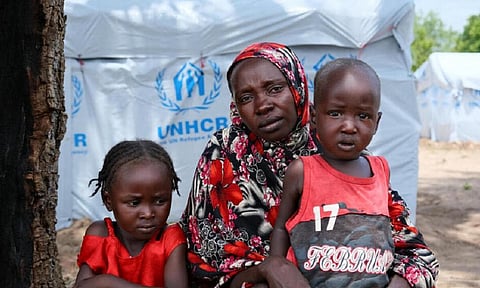

The combined impact of armed conflict and climate risks weakens people’s ability to cope with disasters, a new report from the International Committee of the Red Cross (ICRC) showed.
Countries affected by conflict are also disproportionately impacted by climate change, it highlighted. This double threat that pushes people out of their homes, disrupts food production, cuts off supplies, amplifies diseases and weakens health-care services.
The report When rain turns to dust published July 7, 2024 is based primarily on research conducted in 2019 and 2020 on three case studies — the interior of the Central African Republic (CAR), southern Iraq and northern Mali.
The CAR, Iraq and Mali are all enduring protracted conflict or are in a state of fragility. These three countries are especially vulnerable to climate change, in part because of their geographical location but more importantly, because of the lasting consequences of conflicts for communities, systems, institutions and authorities.
The report explores how people experience the combined consequences of armed conflict and climate risks and how they cope and adapt.
In CAR, people focused on the tensions between farmers and herders due to changing human movement patterns there and the limited capacity of authorities to regulate it.
In northern Mali, pastoralists and farmers described how their ways of coping with repeated droughts and occasionally, heavy rains have been disrupted by the conflict and how that is accelerating changes to their way of life.
In Mali, pastoralists were deterred from travelling with their livestock by the fear of being attacked on the road by armed groups. They gathered in certain areas — most often, close to water sources. The added pressure on already scarce resources created tensions over water with farmers and fishermen who were also trying to cope.
In Iraq, places like Faw, south of Basra, people attribute their water and farming problems to the cutting of emblematic date palms for military purposes during the Iran-Iraq war.
Overall, the report found that conflicts weaken societies and their ability to engage in concerted long-term efforts to help people adapt to the consequences of the climate and environment crisis.
In the absence of adequate institutional support, individuals and communities try to cope by changing or diversifying their livelihoods, adapting their way of life or moving away from their homes.
In the interior of CAR, people who had fled the violence and settled in temporary settlements on the outskirts of urban areas endured heavy rains. Others, who had managed to stay home despite the violence or had returned from displacement, saw their shelters washed away by the floods and ended up being displaced.
The ICRC is calling for mobilisation from within and beyond the humanitarian sector so that climate action and finance reach conflict zones and to ensure that communities hit hardest get the support they need to adapt to a changing climate.